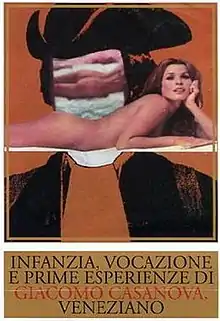Giacomo Casanova: Childhood and Adolescence
Infanzia, vocazione e prime esperienze di Giacomo Casanova, veneziano (literally Childhood, Vocation, and First Experience of Giacomo Casanova, Venetian, internationally released as Giacomo Casanova: Childhood and Adolescence and Casanova: His Youthful Years) is a 1969 Italian comedy film directed by Luigi Comencini.[1] It tells of the youth named Casanova, who, after an unhappy childhood and early ecclesiastical activity in Venice, became an abbot and abandoned his vocation for the love of a countess. Despite the plot, more than a portrait of Casanova, the film wants to be a vivid fresco of the Venetian society of the time.[2][3]
| Giacomo Casanova: Childhood and Adolescence | |
|---|---|
 | |
| Directed by | Luigi Comencini |
| Produced by | Luigi Comencini |
| Screenplay by | Suso Cecchi D'Amico |
| Starring | Leonard Whiting Lionel Stander Maria Grazia Buccella |
| Music by | Fiorenzo Carpi |
| Cinematography | Aiace Parolin |
| Edited by | Nino Baragli |
Release date | 1969 |
Running time | 102 min |
| Country | Italy |
| Language | Italian |
Plot
In 1742 in Venice, the young Giacomo Casanova is in a great trouble. A few years previously, in the seminary in Padua, Giacomo had experienced his first love, though he was destined to be a priest. While Giacomo now follows the seminary, the young noble is to sneak into a palace of beautiful girls and spend the night. One day, Giacomo falls in love with a beautiful countess, so he decides to abandon his studies to become a priest for being a daring libertine.
Cast
- Leonard Whiting: Giacomo Casanova
- Maria Grazia Buccella: Zanetta
- Lionel Stander: Don Tosello
- Raoul Grassilli: Don Gozzi
- Wilfrid Brambell: Malipiero
- Tina Aumont: Marcella
- Mario Scaccia: Dottor Zambelli
- Silvia Dionisio: Mariolina
- Senta Berger: Giulietta Cavamacchia
- Cristina Comencini: Angela Rosalba Mocenigo
- Clara Colosimo: Giacomo Casanova's Grandma
- Ennio Balbo: Mocenigo
- Evi Maltagliati: Contessa Serpieri
- Jacques Herlin: Monsieur Alexandre
- Umberto Raho: Il vescovo
- Linda Sini: Mother Teresa
- Gino Santercole: Baffo
- Gigi Reder: Salvatore
References
- "La "dolce,, educazione di Giacomo Casanova". La Stampa. January 7, 1970. p. 6.
- Jean A. Gili. Luigi Comencini. Gremese Editore, 2005. pp. 63–66.
- Orio Caldiron, Matilde Hochkofler. Scrivere Il Cinema: Suso Cecchi D'Amico. Dedalo, 1988. pp. 103–104.